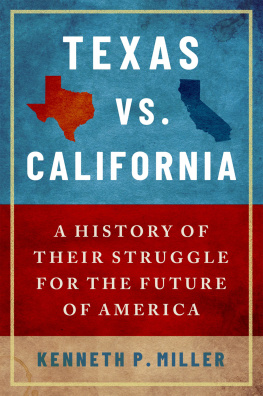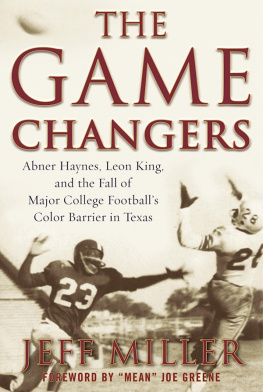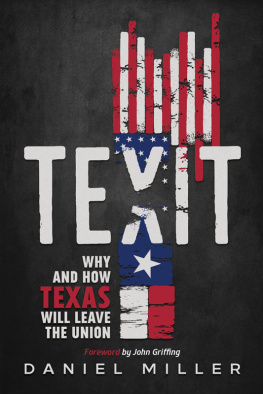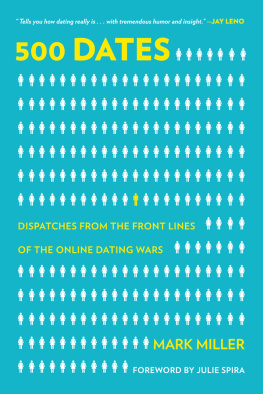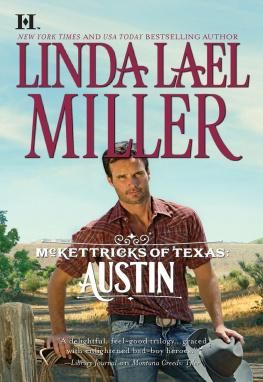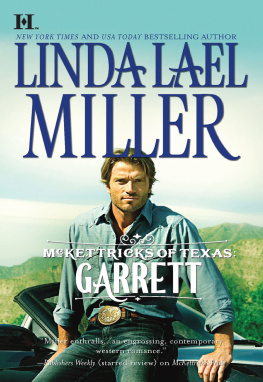Fifty Years of the
TEXAS
OBSERVER
Fifty Years of the
TEXAS
OBSERVER
Edited by CHAR MILLER
Foreword by MOLLY IVINS
TRINITY UNIVERSITY PRESS
San Antonio, Texas
PUBLISHED BY TRINITY UNIVERSITY PRESS
San Antonio, Texas 78212
Copyright 2004 by the Texas Democracy Foundation All rights reserved. No part of this book may be reproduced in any form or by any electronic or mechanical means, including information storage and retrieval systems, without permission in writing from the publisher.
Every effort has been made to secure permission to publish these articles. In those instances where we were unable to determine and/or locate the actual copyright holders, we ask that they contact Trinity University Press.
Cover design by DJ Stout, Pentagram, Austin, Texas Book design and composition by BookMatters

The paper used in this publication meets the minimum requirements of the American National Standard for Information Sciences-Permanence of Paper for Printed Library Materials, ANSI Z39.48-1992.
LIBRARY OF CONGRESS CATALOGING-IN-PUBLICATION DATA
Fifty years of the Texas Observer / edited by Char Miller; foreword by Molly Ivins.
p. cm.
ISBN 978-1-5953-4087-0
1. TexasPolitics and government1951 2. Texas Intellectual life. 3. TexasSocial conditions. 4. Texas Environmental conditions. 5. Political cultureTexas. 6. Progressivism (United States politics). I. Miller, Char, 1951 II. Texas observer.
F391.2.F54 2004
16 15 14 13 12 / 5 4 3 2
Contents
First, an apology. No single compilation of writings from the Texas Observer can do justice to this journal of free voices. For fifty years, its staff and freelance contributors have covered an extraordinary range of issues in Texas (and far beyond), and have done so with insight, wit, and verve. There is no other magazine of its kind in the nation, a characterization made all the more unique by the sheer quantity and stunning quality of the articles that have appeared in its pages for five decades. The Observers enduring legacy of cutting-edge, investigative journalism has complicated my task of selecting which pieces would represent its arguments and perspectives. I can only hope that I have been able to capture the essence of its extraordinary recording of the people, the place, and the times.
I could not have produced this volume alone, of course, and am deeply grateful for the suggestions, aid, and commentary of current and former members of the Observer staff. Coeditor Barbara Belejack has been a tremendous help in thinking out the outlines of the project and its importance. David Denison offered detailed suggestions of potential articles to include and a framework by which they might best be understood. Conversations, by phone and email, with Lou Dubose, Ronnie Dugger, Molly Ivins (and her wondrous assistant Betsy Moon), Michael King, Kaye Northcott, and Geoff Rips were as essential as they have been supportive, yet another illustration of just how strong the Observers editorial staff has been since 1954. Another former staffer, Jeff Mandell, suggested a couple of key additions, and Steve Moore weighed in with some shrewd picks. Thanks, too, go to the many who kindly granted permission for their words to appear in this volume; their interest in the project has made it a pleasure to work on.
This collection would have been a lot more difficult to produce in an earlier era. But at the Coates Library at Trinity University, with its microfilm readers linked to digital scanners, I was able to read, copy, and then save articles on-line; a special thanks to University Librarian Diane Graves for securing this technology just in time for this project! Its implementation also facilitated the editing process, allowing me and my gifted research assistant, Laura Fries, to check and double-check the full run of the Observer with some dispatch. Alas, the scanned documents still had to be retyped, and I am greatly in the debt of Eunice Herrington, senior secretary of the History Department, who worked nonstop and at high speed to produce a working draft of the lengthy manuscript; Rosie de la Rosa contributed to this process as well. As they typed these documents, they also shared their reactions to them, which were invaluable as I made the final selections. The work that my staff, my research assistant, and I did on this project was in large part funded by the Joullian Endowment Fund of the History Department.
And, finally, I am doubly lucky to have been able to work with the staff at the Trinity University Press. Director Barbara Ras and Sarah Nawrocki are a dream team of skilled editors and writers who love to talk about books, and who help make them come to life. So do Dave Peattie of BookMatters and copyeditor Mike Molletttheir insights and comments were critical. But most of all, and again, I owe so much to Barbara Ras, who has been crucially involved in every aspect of this project, from its conception to its realization. Ever willing to talk about its fascinations and frustrations, she has been its best critic and greatest advocate.
In journalism school, we were taught to avoid the word unique on the grounds it is highly unlikely there is anything totally unprecedented under the sun. But there is no other word for the Texas Observer. It is the only one of its kind, a publication in a class by itself. Fifty years of the Observer is a half-century of journalism so special and so remarkable it is actually awesome.
One can enumerate the excellence of the Observer in many ways. The roster of its editors is an extraordinary list of journalistic talent, starting with Ronnie Dugger, who did it all by himself for a long time, and including the late Willie Morris, Bob Sherrill, Larry Goodwyn, Kaye Northcott, Jim Hightower, Geoff Rips, Lou Dubose, Michael King, Nate Blakeslee, and many others. The Observers writers over the years have included pretty much everybody worth reading in the state, starting with the holy trinity of J. Frank Dobie, Roy Bedichek, and Walter Prescott Webb, and continuing with Bud Shrake, Gary Cartwright, Larry L. King, Larry McMurtry, Mad Dog Helmer, Billy Porterfield, Elroy Bode, Amado Muro, Katherine Anne Porter, and on and on.
Or you could list the scandals the Observer has unearthed, from the appropriations process of the 1950s to the drug busts in Tulia, or the politicians it has brought down over the years. You could count the number of squalid little deals it has exposed, the amount of money it has saved the taxpayers (including my memorable expos of the great House Christmas card rip-off) or the number of Bad Bills the Observer has knocked off by exposing the idiocy of their content.
One could also bring back the years with the names of the politicians and public figures we wrote about, from the heroic to the horrificRalph Yarborough, Allan Shivers, John Connally, Lyndon Johnson, Sam Rayburn, Martin Dies, Judge Woodrow Wilson Bean, Goodtime Charlie Wilson, Ann Richards, George Bush (both father and son), Tom DeLay, Mad Dog Mengden, the Unspeakable Bill Hollowell, Barbara Jordan, Henry B. Gonzalez, Wright Patman. The names of the places seem to roll out as well, from Alice to Dallas, from Ozona to Odessa, from Dimebox to Del Rio. Dugger once observed, To a Texan, a car is like wings to a seagull. Our places are far apart and we must dip into them driving. For an often-traveling man like myself, the junctions in the highways and the towns are like turns in a city well-known. I remember driving through the soft night air of the East Texas piney woods with Willie Nelson playing softly on the radio and blasting through the Panhandle under a blazing sun and pale blue sky listening to Clarence Zugenbulers stock report on WBAP, the Country Giant. Generations of


 The paper used in this publication meets the minimum requirements of the American National Standard for Information Sciences-Permanence of Paper for Printed Library Materials, ANSI Z39.48-1992.
The paper used in this publication meets the minimum requirements of the American National Standard for Information Sciences-Permanence of Paper for Printed Library Materials, ANSI Z39.48-1992.
